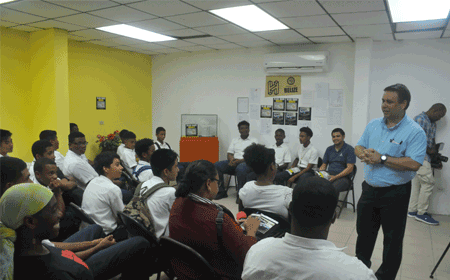BELIZE CITY, Thurs. June 6, 2019– There is a lot of history that is not being taught in the schools of Belize. The history of the Africans who were brought to Belize as slaves, and the Maya peoples who first populated Belize, has been neglected for generations, during the colonial period and later in the independent state of Belize, until St. John’s College incorporated the study of African and Mayan history in its curriculum.
Today, at a short ceremony on its campus, the class of SJC 2E and their history teacher, Delmar Tzib, launched a book which was a collaborative effort of the students. The idea for the book grew out of an assignment to write a poem about the nurse, Vivian Seay, and the Black Cross Nurses that she led.
Yasser Musa, another teacher who has been instrumental in the school’s effort to include African and Mayan history in the school’s curriculum and who pioneered the SJC History Club, declared that the launch of the book on the Black Cross Nurses was a very important event.
Musa explained that SJC is the only school in the country that teaches the history of African and Maya civilization from First Form, and teaches Belizean History with an emphasis on the people’s struggle from 1491 to 1981. He said that the teacher of the 2E class, Delmer Tzib, was the one who drove the narrative. Musa said a lot of us know that stories are told to us, but we do not know the motive behind the stories. Tzib involved his students as participants, Musa said.
Tzib said that the book is the result of the students’ work, after they thought about Marcus Garvey and the work that he did. The students were tasked to write a poem as a group, but one student, Chris Garbutt, decided to write his poem alone. “His poem was amazing and I know that his poem was the poem we had to analyze,” Tizb said.
“We took two hours of our time to try to understand what he was trying to say in his poem. The project broke the barriers of the teacher always being the one who is informing and it broke the barrier of the students always being the one always receiving, because they took the role of leading these lessons. It is their work that I am proud of today,” Tzib said.
Gill Gilharry, one of the students, said that they created the book as a class. “Most of us did not know that we were creating this book. All we knew was that Mr. Tzib was creating a book previously and wanted some help from students. Most of us did our poems and analysis without knowing that it would be published in a book,” Gilharry said.
Gilharry added, “I believe that the analysis of the Black Cross Nurses was helpful to break us from the typical way of thinking. We freed up our minds through the philosophical thinking of Marcus Garvey and other black people. We learned how they uplifted us and helped us in our toughest times. The Black Cross Nurses was an organization under Garveyism. They were very profound women who tried to help their community. They were seen as the lowest people in the community. They were not only black but they were women. They fought the patriarchy and uplifted a settlement that was oppressed by the whites. At first, they were seen as a burden to the colonial government, but over time they were used as a welfare tactic to help improve the healthcare of the settlement.”
Musa said that he gets very emotional whenever he hears a young person (Gilharry) speak with such clarity and such coherence, because people come with an agenda of what they want you to know and think. Musa said that we have to start to develop this incubator of new ideas that Mr. Tzib has triggered.
Musa praised the students, explaining than one cannot get to a higher level than where they are because “they are not memorizing and regurgitating, they are thinking and analyzing.”
The program ended with the poem by Chris Garbutt that inspired the book, Black Cross Nurses:
I will tell you of a story not shown on television,
About the UNIA, an association with a vision,
Uplifting black people, that was their dream,
They were tired of the white people being mean,
One of their programs tackled our health system,
Because blacks worry about blacks
Whites only care of their wealth,
The colonial government was not happy at all,
They rather white rise and see blacks fall,
They were against this brilliant organization
Nurses had to find their own training and education,
After a period of time the government came through,
They used the nurses and the Black Cross to help all of you
In a way it came out of the
Garveyite movement itself,
Not moving the many but helping
their health,
At first it was just an idea,
what more can it be?
Oh look at them now, just like
Vivian Seay
The UNIA looked out for each other,
Because white or blacks, we should care for one another,
The United Negros always face problems at the door,
Because of people like them we should struggle no more!!!

